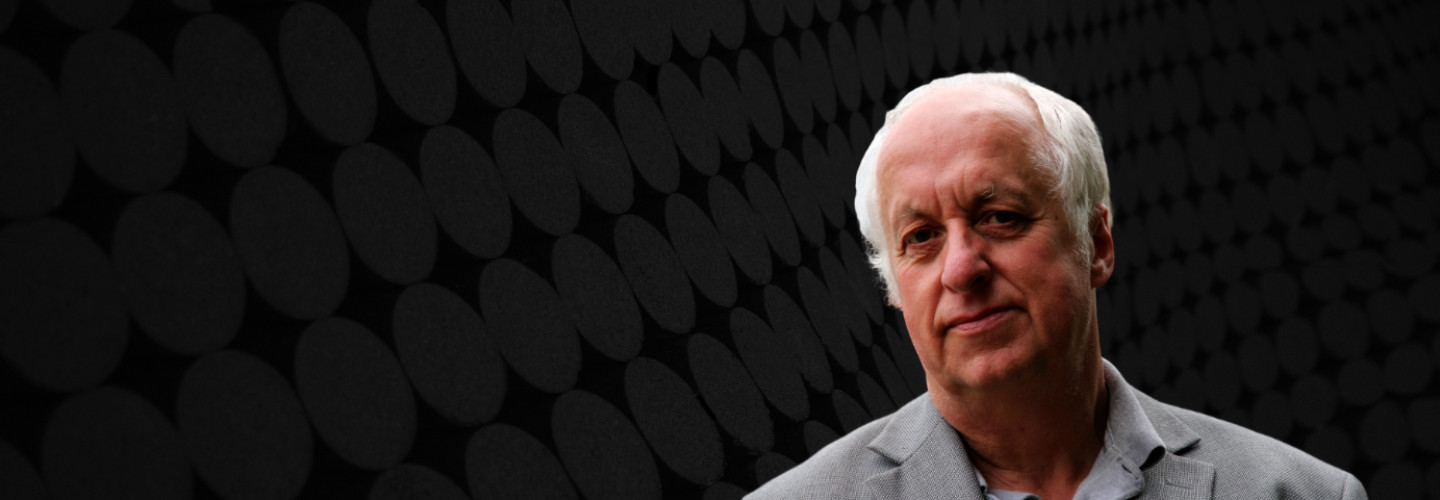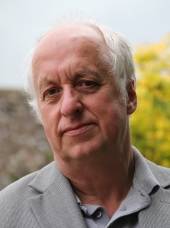
Works by Paul Patterson
Biography
Paul Patterson was born in Chesterfield in 1947, but grew up in Exeter. He learnt the trombone at school, and became a member of several local bands and orchestras. At seventeen he gained a place at the Royal Academy of Music, having just started to compose his own music. Early, and sustained, musical influences on Patterson's work were the refined, neo-classic lines of Stravinsky and Hindemith and Bartok's motivic structures. His first two published compositions were prophetic. Humour surfaced first, in his Opus 1, his Dartington Summer School setting of Hilaire Belloc's famous Cautionary Tale, Rebecca (1966), which can be seen as a satire on many of the avant-garde aleatoric techniques of the day. Opus 2, a wind quintet written for the Nash Ensemble a year later, shows his formative influences seeding a personal compositional style, in the shape of the dancing vitality of irregular rhythmic patterns, a contemplative slow movement and organic growth within an atonal, contrapuntal texture.
Humour surfaces many times in later works, such as Comedy for Five Winds Op. 14 (1972) for the Vega Wind Quintet, and the more experimental sound-world of Time PieceOp. 16, written in 1973 for the King's Singers. For many, humour is the introduction to Patterson's music but, to appreciate other aspects, it helps to know that he learned to sail in his early teens, and it became an important part of his life. Patterson’s ability to write extended melodic lines is evidenced by the slow central movement of Duologue Op. 49 (1984) for oboe and piano, for example, but the writer suggests that his music’s marked characteristic of multi-layered counterpoint reflects the currents, tides, waves, wavelets and iridescent spray of the sea. Indeed, the form and colourful orchestration of White Shadows on the Dark Horizon Op. 67 (1988), written for the Kent County Youth Orchestra, overtly exploits that relationship.
Patterson's student days ended with further study with Richard Rodney Bennett, and he remained at the Royal Academy as Manson Fellow and teacher of composition. It was then he discovered the Polish composers Lutoslawski and Penderecki. As he adopted their new notation symbols, and made the first of many visits to Poland, an enhanced expressiveness surfaced in his music, reaching new heights in the excoriating sounds of Voices of Sleep, Op. 40, performed at the Proms in 1981. Yet many musicians at that time found the new notation difficult, so Patterson reverted almost entirely to conventional notation, especially for the major choral works Mass of the Sea Op. 47 (1983), Stabat Mater Op. 57 (1986), Te Deum Op. 65 (1988), Magnificat Op. 75 (1994) and the Millennium Mass Op. 85 (1999) – not forgetting the exquisite a capella Missa Brevis Op. 54 of 1985.
1985 was the year Patterson was appointed Head of Composition at the Academy and, in the previous year, he had initiated the pioneering series of annual Composer Festivals, bringing such international composers as Lutoslawski, Tippett, Penderecki, Berio and many others for a week of concerts and work with the students. However, his practical and emotional involvement in Poland and its music could not be denied, and it was expressed with renewed intensity in the conventionally notated Luslawice Variations Op. 50, for solo violin. Undercurrents of tension and poignancy, especially in the slow movements of his works, have always been there; for example in the Concerto for Orchestra Op45, written for the CBSO in 1981, and in the poised melodic line of the slow movement of the Violin ConcertoOp. 72 (1992), while in the Clarinet Concerto Op. 34 (1976) it is there throughout.
By now, it was evident that Paul Patterson had an enviable ability to write in any style or genre. Among his works not mentioned so far one finds several for electronic tape and various combinations of instruments, film and TV music, works for solo harp and The Sorriest Cow of Capricorn Op. 63 (1987) a song-cycle for soprano and piano – sharply-witty and darkly-coloured to suit the grim undertones of writer Mervyn Peake’s fantasy world. Several prestigious commissions were coming his way, including the phenomenally successful Little Red Riding Hood Op. 73, commissioned by the Roald Dahl Foundation in 1992, which has travelled the world and which he has since arranged for numerous combinations of instruments. The Royal Eurostar Op. 76 for large brass ensemble and percussion, was commissioned for the State Opening of the Channel Tunnel in 1994; while Hell’s Angels Op. 81 (1998) commissioned by the Crouch End Festival Chorus, which Patterson scored for soprano solo, chorus, amplified string quartet and percussion, inspired him to re-enter the musical underworld already inhabited by Voices of Sleep and give his imagination full flight.
Patterson has written eight varied and significant works for organ; they are signposts to his compositional development, being commissioned at regular intervals between 1969 (Jubilate Op. 5) and 2007 (Brumba Op. 100). Of the eight, Games Op. 37, commissioned for the finals of the Improvisation Contest of the 1977 St. Albans International Festival, stands unique. Its impressive 18-page graphic score encourages a modern form of directed improvisation, based around Messiaenic harmonies and Polish-style controlled aleatoricism.
In 2005 Patterson composed The Fifth Continent: a Gift from the Sea Op. 96 to Ben Kaye’s poem about the Romney Marsh, for counter-tenor (or mezzo-soprano) solo, chorus, brass ensemble and organ. In 2010 he was invited to China to give lectures and to hear performances of his Phoenix Concerto Op. 102 for oboe and string orchestra (2009), and in 2012 he went to Thailand for the world première of his latest work for harp, LizardsOp. 111, commissioned for the second Thailand International Harp Festival and Youth Competition. Many of Patterson’s compositions have been composed for, or are chosen as, competition set pieces such as SpidersOp. 48 (1983) for solo harp and Tides of Mananan Op. 64 (1987) for solo viola. All Patterson’s concerti are scored for strings only and there is now the Cello Concerto Op. 90 (2002), Allusions Op. 99 (2006) for two violins and a Viola Concerto Op. 101 (2009); while also premièred in that year was Avian Arabesques Op. 106 for harp ensemble.
Patterson is Manson Professor and a Fellow of the Royal Academy of Music, Fellow of the Royal College of Music, Hon. Fellow of the London College of Music, Fellow of the Royal Society of Arts, Visiting Professor at the Royal Northern College of Music, Canterbury Christ Church University and the Royal Marines school of Music at Portsmouth. In 1987 he received the Medal of Honour from the Polish Ministry of Culture; in 1996 the Performing Rights Society and the Royal Philharmonic Society awarded him the Leslie Boosey Award for outstanding services to contemporary music, and in 2009 he was given the Polish Gold Medal for promoting Polish music.
Patterson’s reputation is secure as one of the most versatile, successful and internationally-respected British composers of his generation. Commissions include the BBC, RPO, LPO, CBSO, Netherlands Residente Orchestra, Zurich Chamber Orchestra, Basel Symphony Orchestra, London Sinfonietta, Academy of St.Martins in the Fields, the Nash Ensemble, London Mozart Players, Orchestra of St.John’s Smith Square, English Chamber Orchestra, the Bach Choir and the King’s Singers; performances have taken place in many prestigious venues such as the Lincoln Centre, Carnegie Hall, Amsterdam Concertgebouw and Christ Church Cathedral, New Zealand. Recordings include: EMI, Hyperion, Champs Hill, Dutton, ASV, Polyphonic, Priory, Pearl, Phillips and SFZ Music.
One of the most frequently-performed contemporary composers, Paul Patterson’s works certainly include those in cutting-edge styles of the avant-garde, but his music never alienates – rather, it draws both audiences and performers in to contemplate, and rejoice in, the complex spirit of our time.
Dr. Rosemary Dunn. November 2012

